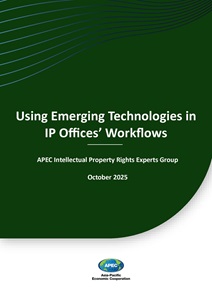
Reports
Using Emerging Technologies in IP Offices’ Workflows
The Asia-Pacific Economic Cooperation (APEC) is a regional economic forum established in 1989 to leverage the growing interdependence of the Asia-Pacific.
The Asia-Pacific Economic Cooperation (APEC) is a regional economic forum established in 1989 to leverage the growing interdependence of the Asia-Pacific.
APEC ensures that goods, services, investment and people move easily across borders. Members facilitate this trade through faster customs procedures at borders; more favorable business climates behind the border; and aligning regulations and standards across the region.
APEC ensures that goods, services, investment and people move easily across borders. Members facilitate this trade through faster customs procedures at borders; more favorable business climates behind the border; and aligning regulations and standards across the region.
APEC works to help all residents of the Asia-Pacific participate in the growing economy.
APEC works to help all residents of the Asia-Pacific participate in the growing economy.
Capacity building projects play an important role in helping translate APEC's goals into reality.
Capacity building projects play an important role in helping translate APEC's goals into reality.

Proceedings
•June 2025
Download Report
1MB
Published Under
SOM Steering Committee on Economic and Technical Cooperation (SCE), Emergency Preparedness Working Group (EPWG)
Accessed
669
Pages
58
The Workshop Report of the project EPWG 201 2023A titled “Enhancing International Relief Activities in Disaster Risk Management among APEC economies” provided discussions on various aspects of emergency preparedness and disaster risk reduction, with a particular focus on international relief activities in emergency disaster risk management. Representatives from government agencies, international organizations, and research institutions were said to have exchanged insights on best practices, lessons learned, and strategies for strengthening disaster resilience at the economy and also regional level.
Key discussions revolved around international coordination mechanisms, the role of humanitarian organizations, and the mobilization of resources for disaster-affected regions. Participants reportedly emphasized the need for streamlined procedures in cross-border disaster response, stressing the importance of clear communication channels, standardized aid distribution frameworks, and pre-established and future agreements between economies to facilitate rapid relief efforts against the impact of natural disasters.

